We are supported by our audience. When you purchase through links on our site, we may earn an affiliate commission, at no extra cost for you. Learn more. Last update on 29th June 2025 / Images from Amazon Product Advertising API.
I’ve identified ten essential Warhammer 40,000 books that span every accessibility tier and narrative style. *Horus Rising* and *The Lion: Son of the Forest* serve as premier entry points, while *Hero of the Imperium* offers humor-balanced grimdark themes. *Eisenhorn* and *Ravenor* deliver character-driven investigations, *Night Lords* explores Chaos Marine psychology, and *The Infinite and the Divine* provides Necron lore through rivalry dynamics. *Siege of Vraks* focuses on military warfare, while the Aeldari Codex supplies detailed faction information. Each title below reveals specific strengths and target audiences.
Notable Insights
- Hero of the Imperium serves as an accessible entry point, combining humor with darker themes through Commissar Ciaphas Cain’s adventures.
- Horus Rising provides essential foundational lore, exploring the tragic fall of Horus and core themes of betrayal within the Imperium.
- Eisenhorn Omnibus offers exceptional worldbuilding and character development through Inquisitor Gregor Eisenhorn’s morally complex missions against Chaos.
- The Infinite and the Divine delivers character-driven storytelling that explores Necron culture through the millennia-spanning rivalry between two iconic characters.
- Night Lords Series provides deep character exploration of Chaos Marines, featuring exceptional storytelling about failure, ambition, and warband dynamics.
Siege of Vraks: Warhammer 40,000
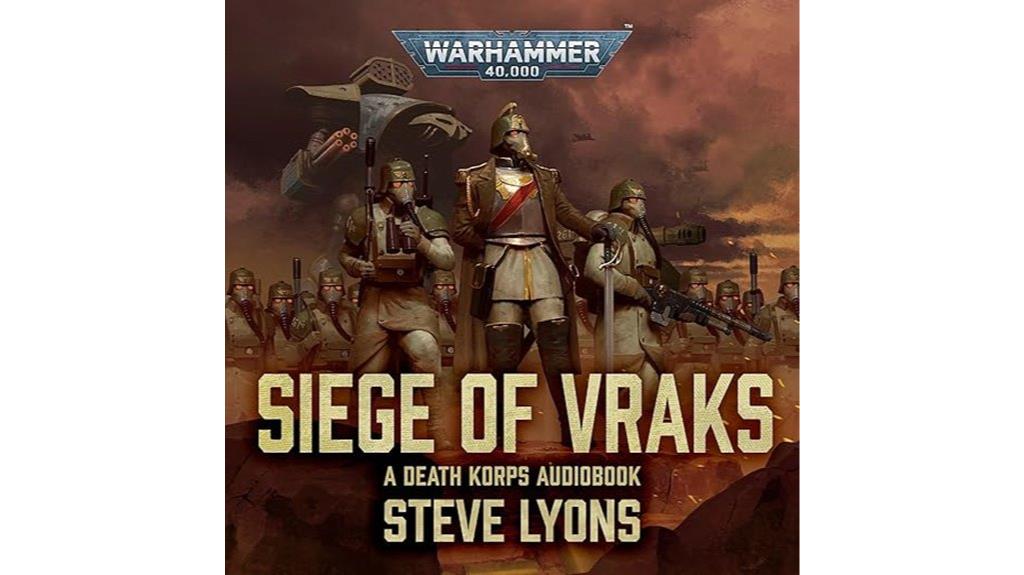
*Siege of Vraks: Warhammer 40,000* delivers an uncompromising portrayal of attrition warfare that appeals specifically to readers seeking detailed military fiction within the grimdark universe. Steve Lyons crafts intricate descriptions of trench warfare and massive siege engines. You’ll find the Death Korps of Krieg portrayed with unexpected humanity despite their grim reputation. The narrative balances military logistics with character development, though pacing occasionally slows due to technical detail density. This approach creates realism that some readers find overwhelming while others appreciate its authenticity. The novel effectively conveys hopelessness and Imperial warfare scale. Newcomers may struggle with jarring themes, but seasoned fans consistently rate it four stars, often requesting trilogy expansion.
Best For: Seasoned Warhammer 40K fans who enjoy detailed military fiction and are particularly interested in Death Korps of Krieg lore and attrition warfare narratives.
Pros:
- Intricate and authentic portrayal of trench warfare with detailed military logistics that adds depth and realism
- Humanizes the Death Korps of Krieg while effectively conveying the hopelessness and massive scale of Imperial warfare
- Strong balance of character development with battle scenes that creates an engaging grimdark narrative
Cons:
- Slow pacing due to dense technical details that may overwhelm readers seeking faster-moving narratives
- Jarring themes and complexity can confuse newcomers unfamiliar with Warhammer 40K universe
- Intricate detail density occasionally interrupts narrative flow for those preferring streamlined storytelling
HERO OF THE IMPERIUM (Warhammer 40,000)
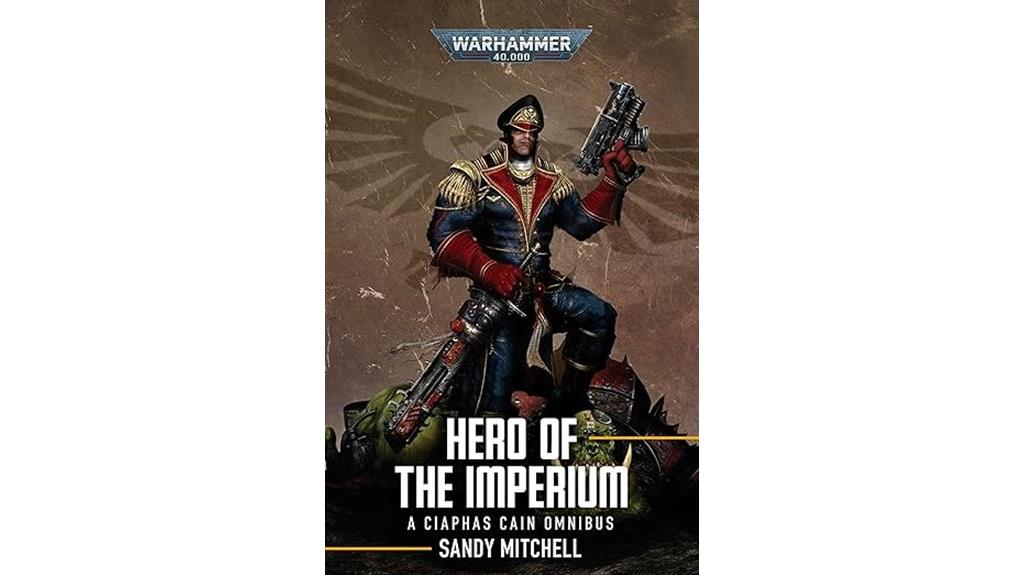
“Hero of the Imperium” serves as the ideal entry point for readers new to Warhammer 40,000’s expansive universe while delivering substantial value to existing fans. This omnibus contains three complete novels and three short stories featuring Commissar Ciaphas Cain. Author Sandy Mitchell employs a unique narrative approach where Cain’s memoirs reveal his heroic reputation stems from cowardice and survival instincts rather than genuine courage. You’ll encounter major Warhammer factions including Astartes, Orks, and Necrons through accessible storytelling that balances humor with darker themes. The collection introduces lighter tones compared to standard grimdark novels. Reading at a measured pace prevents repetition fatigue. Original pricing offered excellent value at £12, though subsequent omnibuses reach £100 secondhand.
Best For: Newcomers to Warhammer 40,000 seeking an accessible introduction to the universe’s lore and factions, as well as existing fans who enjoy humor-infused storytelling that balances lighter tones with the franchise’s traditionally darker themes.
Pros:
- Excellent entry point that introduces major Warhammer factions through engaging, accessible storytelling that blends humor with serious undertones
- Unique narrative approach using Cain’s memoirs creates ironic humor by revealing heroic deeds as products of cowardice and survival instincts
- Strong value proposition with three complete novels and three short stories in one collection, offering substantial content for both new and existing fans
Cons:
- Author’s repetitive phrases and overly long, convoluted sentences can detract from the reading experience over time
- Humorous conventions may become predictable, potentially lessening the overall impact during extended reading sessions
- Subsequent omnibuses in the series are significantly overpriced and difficult to find, with secondhand copies reaching around £100
Horus Rising: The Horus Heresy, Book 1
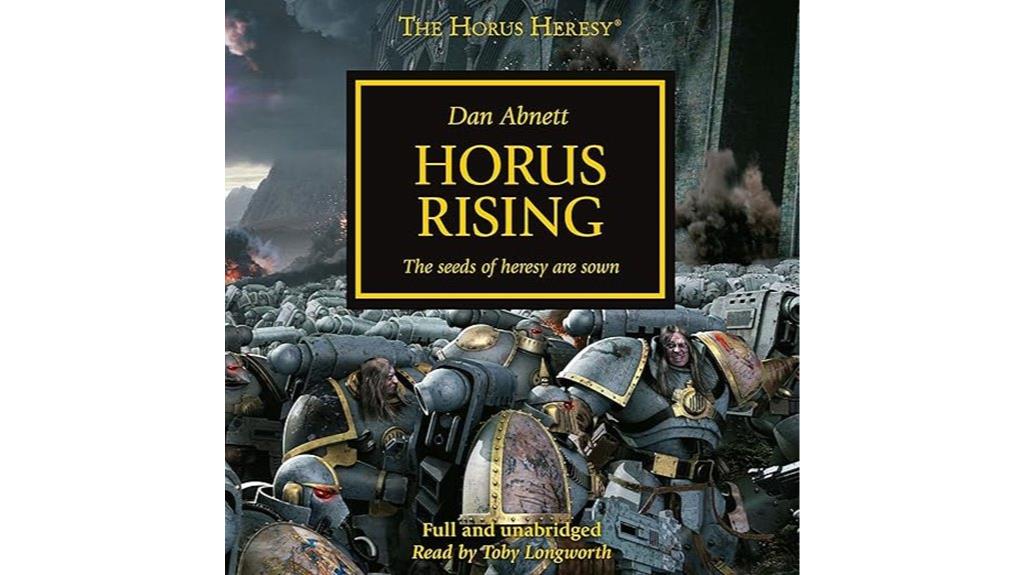
Horus Rising serves as the definitive entry point for readers seeking to understand the foundational lore of the Warhammer 40K universe, particularly those who want to witness the tragic transformation of the series’ most pivotal character before his fall to Chaos. Dan Abnett’s writing style effectively introduces newcomers to the setting while maintaining engagement for experienced fans. The narrative explores core themes of pride, vanity, and betrayal that define the Horus Heresy saga. You’ll encounter detailed battle sequences and character development that establish the foundation for subsequent books in the series. The book functions as essential reading for understanding the Emperor’s Children legion dynamics and the pre-corruption Imperium structure.
Best For: Newcomers to the Warhammer 40K universe who want to understand foundational lore and experience the tragic origins of the Horus Heresy, as well as existing fans seeking to explore the pre-corruption Imperium and witness Horus before his fall to Chaos.
Pros:
- Excellent entry point that effectively introduces newcomers to the Warhammer 40K universe while maintaining engagement for experienced fans
- Masterful exploration of core themes like pride, vanity, and betrayal with strong character development and foreshadowing
- Essential foundation for understanding the Emperor’s Children legion dynamics and the broader Horus Heresy saga
Cons:
- Writing style can be challenging with frequent direction changes and old English style that may be tough for some readers
- Pacing issues where some readers nearly abandon the book after the first third before becoming fully engaged
- Complex lore and worldbuilding may overwhelm readers completely new to the science fiction genre
mmer 40K
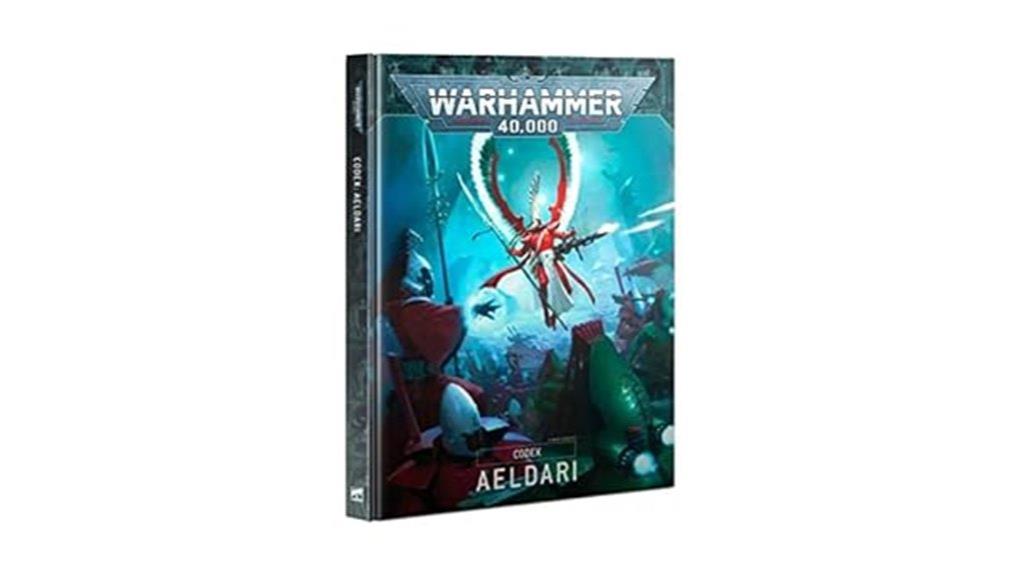
Collectors and players seeking extensive lore coverage for their Aeldari armies will find exceptional value in this 9th edition codex release. You’ll receive a hardcover book packed with detailed datasheets, thorough background material, and high-quality artwork that meets Games Workshop’s standard production values. The codex maintains similar thickness to previous editions while adding new Corsairs content, though this represents more of an upgrade than revolutionary changes.
You can access both physical and digital versions through the included unique code for the WH40K app. This dual format proves particularly useful if you’re new to the faction and want character details before purchasing models. The book’s substantial size delivers essential gameplay rules alongside extensive lore sections that entertain even casual readers.
Best For: Aeldari collectors and players who want comprehensive lore, detailed datasheets, and high-quality artwork in both physical and digital formats.
Pros:
- Exceptional print quality with extensive lore content and excellent artwork that maintains Games Workshop’s high production standards
- Includes unique code for digital copy access on WH40K app, providing convenient dual-format accessibility
- Substantial size packed with detailed datasheets and background material, useful for both gameplay and casual reading
Cons:
- Shipping delays can occur, potentially arriving weeks late for gift-giving occasions
- Amazon packaging issues may result in damaged corners on the hardcover book
- New content like Corsairs offers limited additions, functioning more as an upgrade than major expansion
The Infinite and the Divine: Warhammer 40,000
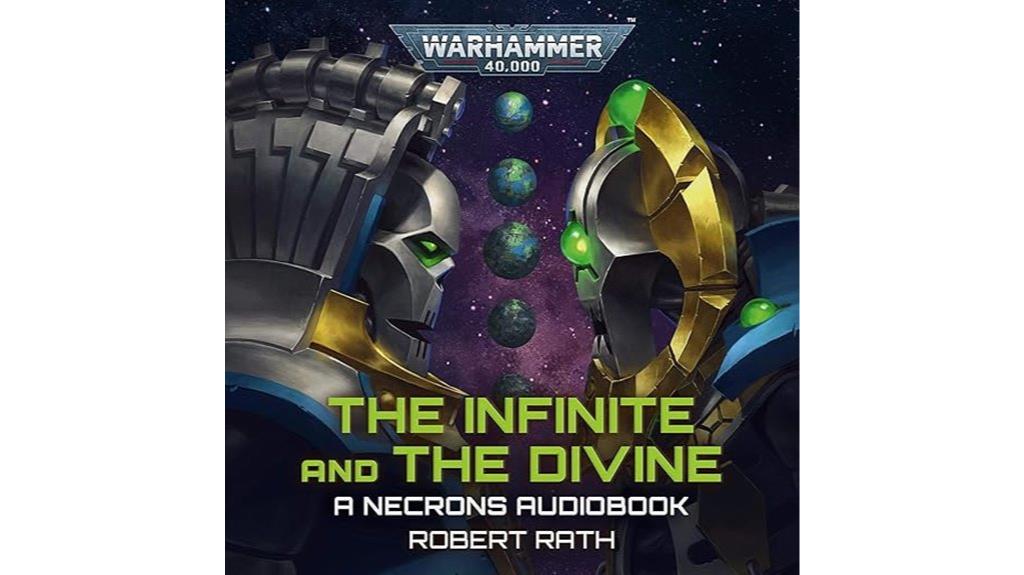
Veteran Warhammer 40,000 enthusiasts seeking character-driven narratives will find “The Infinite and the Divine” delivers an unprecedented comedic exploration of Necron culture through its central rivalry. You’ll experience Trazyn the Infinite and Orikan the Diviner‘s millennia-spanning conflict. The novel transforms traditionally stoic Necron characters into personality-rich protagonists while maintaining their formidable military capabilities.
This character-focused approach requires substantial prior franchise knowledge. You won’t find adequate exposition for newcomers. The humor functions like an extended musical composition – entertaining but potentially overwhelming. Technical execution includes occasional filter word usage that disrupts narrative flow. The epilogue creates tonal inconsistency with the main storyline.
You’ll discover mature themes beneath the comedy, including meaningful character development and immortality perspectives. Rating consistently reaches 4-5 stars among established fans.
Best For: Veteran Warhammer 40,000 fans who enjoy character-driven narratives and want a humorous exploration of Necron culture through an immortal rivalry spanning millennia.
Pros:
- Delivers unprecedented comedic transformation of traditionally stoic Necron characters while maintaining their military prowess and adding personality-rich development
- Features mature themes beneath the humor, including meaningful character growth and unique immortality perspectives that add depth to the entertaining rivalry
- Consistently receives high ratings of 4-5 stars from established fans for its engaging and memorable approach to Warhammer 40k lore
Cons:
- Requires substantial prior franchise knowledge and provides inadequate exposition for newcomers to the Warhammer 40,000 universe
- Contains technical execution issues including occasional filter word usage that disrupts narrative flow during action sequences
- Features an epilogue that creates tonal inconsistency and disconnect from the main storyline’s comedic approach
Eisenhorn: The Omnibus (Eisenhorn: Warhammer 40,000)
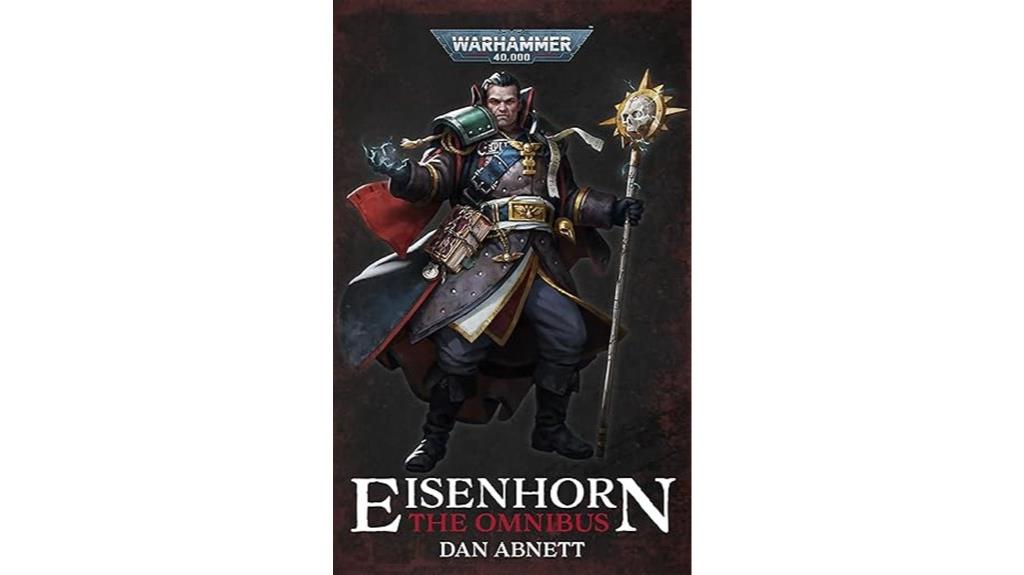
Inquisitor fans seeking an immersive entry point into the Warhammer 40K literary universe will find exceptional value in Eisenhorn: The Omnibus. This collection features three novels plus two short stories following psycher-investigator Gregor Eisenhorn through his corruption-fighting missions. Dan Abnett delivers vivid worldbuilding with detailed landscapes, weapons, and alien descriptions that showcase the galaxy’s perpetual warfare. You’ll encounter compelling character development as Eisenhorn faces harsh moral decisions while battling Chaos-influenced heretics. The writing excels in atmospheric environments and epic battle sequences, though pacing issues occasionally rush important character moments. Mature content including violence and gore makes this suitable for older teens and adults exploring Warhammer 40K’s dark themes.
Best For: Fans of dark science fiction and Warhammer 40K enthusiasts seeking an immersive entry point into the universe’s rich lore through compelling Inquisitor storylines.
Pros:
- Exceptional worldbuilding with vivid descriptions of landscapes, weapons, and alien creatures that bring the war-torn galaxy to life
- Strong character development of protagonist Gregor Eisenhorn with emotionally resonant moral decisions and compelling villains
- Comprehensive collection offering three novels plus two short stories that provide excellent value for exploring the Warhammer 40K universe
Cons:
- Pacing issues that rush important character moments and deaths, diminishing emotional impact
- Supporting characters are less memorable and often replaced without proper acknowledgment of their fates
- Structural writing problems including non-chronological sentence construction and narrative tangents that lead to hurried conclusions
War (Warhammer 40,000)
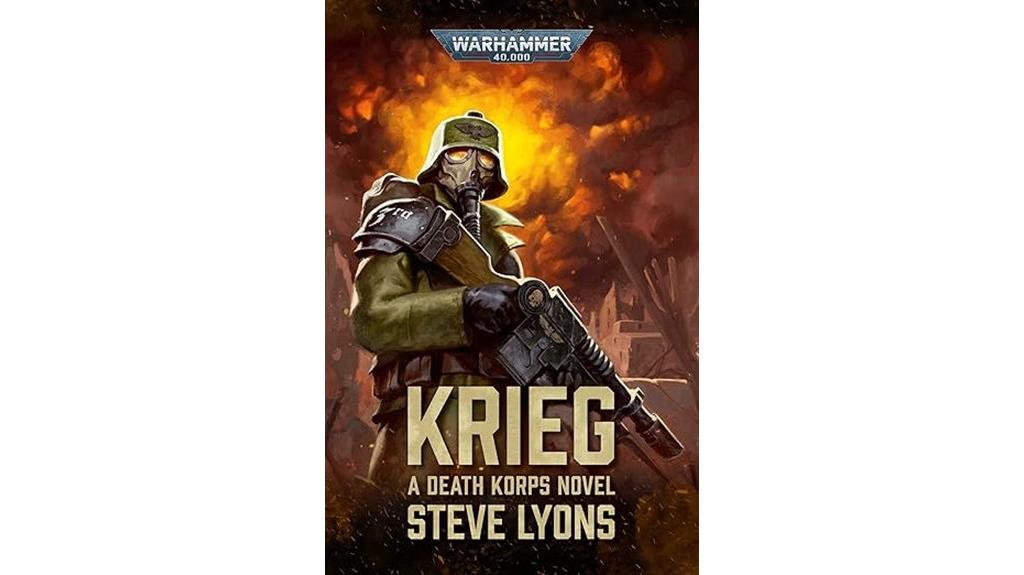
Death Korps enthusiasts and lore seekers will find “War” delivers an exceptional exploration into Krieg’s brutal history through its expertly crafted dual-timeline structure. You’ll experience alternating perspectives between present events and historical flashbacks detailing the Krieg civil war’s origins. The narrative provides multiple Imperial faction viewpoints of the Death Korps, offering nuanced character analysis beyond surface-level zealotry.
Arch Magos Kreel’s formation decisions receive detailed examination alongside the planet’s Imperial reconnection. You’ll encounter significant retcons explaining Death Riders’ origins and new hive designations. Character development proves substantial, particularly Jurgen’s backstory integration.
The book maintains accessibility for newcomers while satisfying veteran readers’ lore expectations. Multiple translations expand readership reach across demographics.
Best For: Death Korps enthusiasts and Warhammer 40,000 lore seekers who want an in-depth exploration of Krieg’s brutal history with detailed character development and multiple Imperial perspectives.
Pros:
- Expertly crafted dual-timeline structure alternating between present events and historical flashbacks that reveal the Krieg civil war’s origins
- Substantial character development with nuanced analysis beyond surface-level zealotry, particularly strong backstory integration for characters like Jurgen
- Accessible to newcomers while satisfying veteran readers’ lore expectations, with multiple translations available for broader readership
Cons:
- Includes significant retcons that change established lore elements like Death Riders’ origins and hive designations
- Heavy focus on Death Korps may limit appeal for readers interested in other Warhammer 40,000 factions
- Brutal historical content and intense narrative themes may not suit readers seeking lighter Warhammer fiction
Night Lords
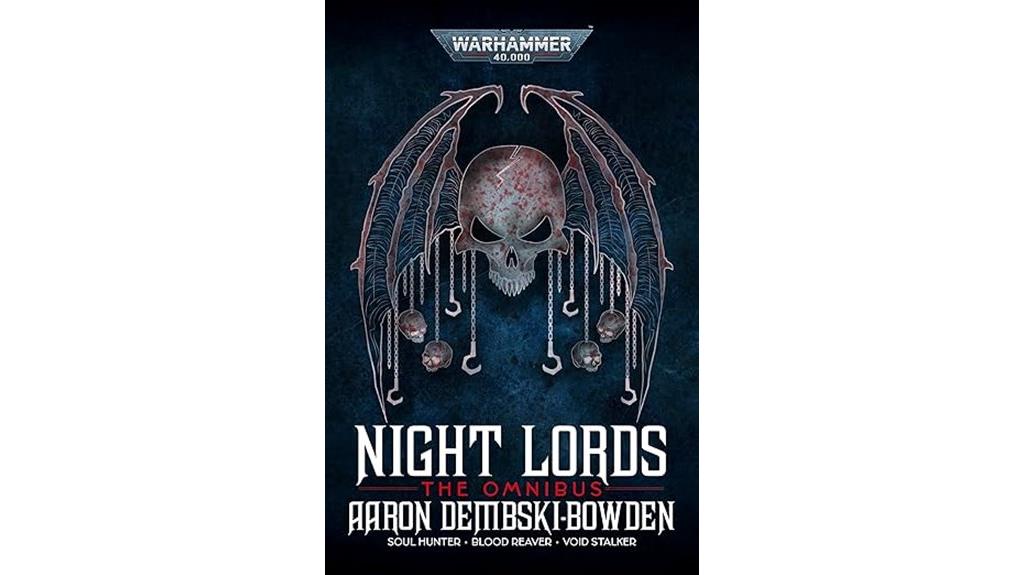
The Night Lords series by Aaron Dembski-Bowden delivers exceptional storytelling for readers seeking deep character exploration within Warhammer 40,000’s chaos marine factions. You’ll discover thorough lore detailing Chaos Warband logistics and daily operations. The trilogy spans three novels plus two novellas, following Talos through themes of failure and ambition across locations from Nostramo to Tsagualsa.
You’ll experience the Night Lords’ pirate operations through vivid space assault sequences. The narrative captures their raider mentality while exploring melancholy character development. Some readers note structural issues including Horus Heresy spoilers and confusing time jumps. Critics argue the series relies on common tropes, though most praise its detailed world-building and character interactions as essential reading for 40k enthusiasts.
Best For: Warhammer 40,000 fans interested in chaos marine perspectives and detailed character development within the Night Lords legion.
Pros:
- Exceptional character exploration, particularly Talos’s journey through themes of failure and ambition with realistic, melancholy development
- Comprehensive world-building that details Chaos Warband logistics, daily operations, and vivid space assault sequences across iconic locations
- Essential lore for the Night Lords faction, capturing their pirate and raider mentality while providing deep insights into chaos marine psychology
Cons:
- Contains potential Horus Heresy spoilers and confusing time jumps that may disrupt narrative flow
- Relies on common tropes and clichés that some critics consider overused within the genre
- May lack sufficient narrative depth for readers seeking more complex storytelling beyond faction-specific lore
The Lion: Son of the Forest: Warhammer 40,000
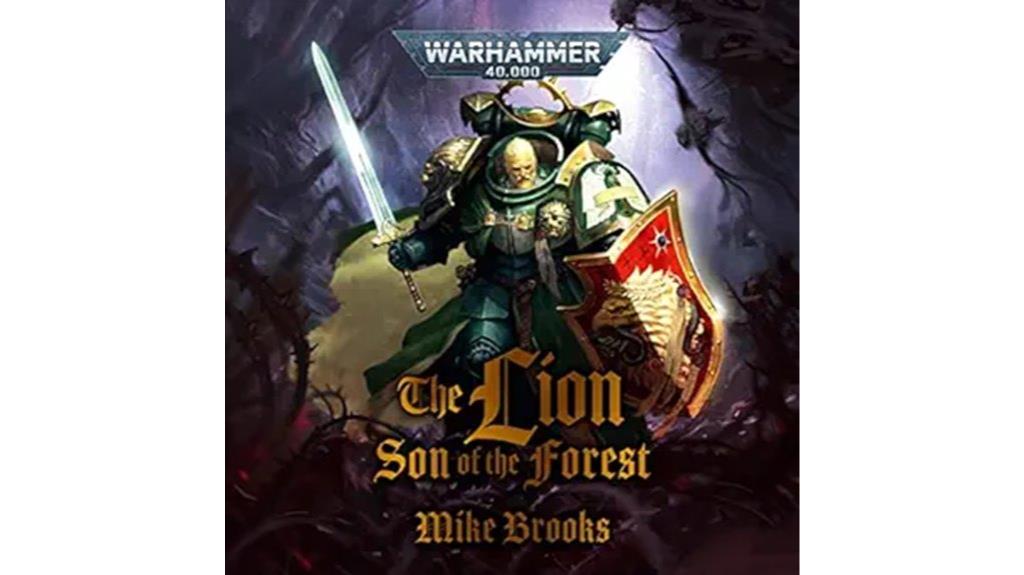
Fans seeking an accessible entry point into Warhammer 40,000 lore will find “The Lion: Son of the Forest” delivers exceptional character development alongside newcomer-friendly storytelling. You’ll discover The Lion awakening in the 41st millennium, offering a fresh perspective on the Imperium’s decline. The narrative successfully shifts between multiple viewpoints—The Lion, Zamiel, and Baelor—while maintaining plot coherence. Previous 40K knowledge isn’t required; basic understanding suffices. You’ll experience themes of redemption and desperation as The Lion searches for his son while protecting humanity. The audio version provides top-quality narration. This standalone entry functions like a comic book hero movie in literary form.
Best For: Newcomers to Warhammer 40,000 seeking an accessible entry point and longtime fans interested in The Lion’s character development and fresh perspective on the 41st millennium.
Pros:
- Exceptional character development that transforms The Lion into an engaging protagonist with realistic self-reflection and positive evolution
- Newcomer-friendly storytelling that requires only basic 40K knowledge while functioning as a standalone narrative
- Skillful multi-perspective storytelling that seamlessly transitions between The Lion, Zamiel, and Baelor while maintaining plot coherence
Cons:
- Limited information provided about intriguing elements like the Dark King, leaving readers wanting more details
- Functions as a standalone entry which may leave fans eager for immediate continuation of the storyline
- Heavy focus on The Lion’s perspective may not appeal to readers seeking broader Warhammer 40,000 universe exploration
Factors to Consider When Choosing a 40K Book
I’ll help you navigate the key factors that determine which Warhammer 40K book will best match your reading preferences and experience level. Your current knowledge of 40K lore greatly impacts which books you’ll find accessible versus overwhelming, while your preferred faction focus narrows down the massive library to specific storylines. Additionally, your tolerance for complex multi-threaded narratives and preference for either grimly serious tone or occasional dark humor will guide you toward authors and series that align with your reading style.
Your 40K Knowledge Level
Advanced readers should explore *The Infinite and the Divine* or *Siege of Vraks* for specialized lore elements. Character-driven stories like *Night Lords* work best when you grasp the broader conflict’s emotional stakes. Your knowledge level directly impacts comprehension and enjoyment.
Preferred Faction Focus
When selecting your next Warhammer 40K novel, your faction preference determines both narrative tone and thematic content. Death Korps of Krieg stories emphasize grim sacrifice and warfare’s brutal reality. Necron narratives often blend dark humor with ancient alien perspectives. Imperial Guard books deliver detailed military strategy and tactical analysis, perfect if you’re interested in warfare mechanics.
Faction choice shapes story expectations considerably. Ciaphas Cain series offers comedic relief through Imperial Guard adventures. Horus Heresy books explore tragic themes through Space Marine perspectives. Each faction embodies distinct characteristics: heroic Space Marines contrast with morally ambiguous Chaos forces.
Military enthusiasts should target Imperial Guard or Chaos Warband stories for strategic depth. These narratives examine leadership complexities and battlefield tactics extensively. Understanding faction lore enhances reading comprehension, providing essential context for character motivations and plot developments throughout the 40K universe.
Writing Style Preferences
Point of view determines your reading experience. First-person narratives create intimate protagonist connections. Third-person perspectives enable multiple character insights and expanded world-building. I suggest considering language density preferences. Some authors favor intricate detail that slows narrative momentum. Others maintain lighter styles that enhance engagement through simplified vocabulary and shorter paragraphs. Match writing complexity to your reading preferences.
Story Complexity Tolerance
How much narrative complexity can you handle before a story becomes overwhelming? Your tolerance level directly determines which Warhammer 40K books you’ll enjoy most.
*Siege of Vraks* demands high complexity tolerance. It weaves military logistics, character development, and atmospheric elements into dense narrative layers. Readers must track multiple plot threads simultaneously.
*Ciaphas Cain: Hero of the Imperium* offers straightforward storytelling. The humor and linear plot structure make it accessible for newcomers or those preferring simple narratives.
*Eisenhorn: The Omnibus* balances complexity with readability. It explores psychological depth and moral ambiguity without overwhelming detail.
*The Infinite and the Divine* provides comedic relief from complex lore. Its lighter approach makes intricate 40K universe concepts digestible.
Consider your attention span and reading preferences before selecting titles.
Humor Vs Grimdark Tone
The balance determines reader engagement levels. Humor-focused works risk losing thematic depth, potentially alienating fans who prefer darker elements. Conversely, heavy grimdark content may overwhelm newcomers seeking lighter experiences. Mixed reactions to comedic attempts demonstrate this challenge clearly.
Your preference should guide selection: choose humorous narratives for engaging, light-hearted experiences or grimdark stories for immersive, intense emotional journeys through hopelessness and sacrifice.
Series Vs Standalone
Consider your goals: series deliver immersive universe exploration, while standalone books provide targeted faction experiences and convenient completion.
Character Development Depth
While faction warfare and galactic conquest provide the backdrop for Warhammer 40K narratives, character development depth determines whether you’ll remember a book years after reading it. Complex protagonists like Gregor Eisenhorn showcase multifaceted moral perspectives that enhance emotional engagement. Effective character arcs reveal personal growth or decline—Horus’s tragic fall and The Lion’s redemption journey demonstrate how development drives thematic resonance. I recommend seeking books that explore internal conflicts within Imperial Inquisitors and Chaos Marines alike. Strong character interactions, such as Trazyn and Orikan’s relationship, provide humor while maintaining emotional depth. Authors who create memorable supporting characters elevate overall storytelling quality. However, avoid books where secondary characters lack development or face abrupt replacement without narrative resolution—this leaves readers unsatisfied despite solid protagonists.
Lore Accessibility Requirements
Compelling characters won’t save your reading experience if you can’t follow the storyline due to lore barriers. I’ve categorized Warhammer 40K novels into three accessibility tiers based on required background knowledge.
Tier one includes *Horus Rising* and *The Lion: Son of the Forest*. These require only basic universal lore understanding. You’ll grasp core concepts like the Emperor, Space Marines, and the Imperium without extensive research.
Tier two features *Ciaphas Cain: Hero of the Imperium* and the *Eisenhorn* series. These demand moderate familiarity with faction dynamics and historical context for full appreciation.
Tier three encompasses *The Infinite and the Divine* and *Siege of Vraks*. These novels assume thorough knowledge of specific factions, character histories, and intricate timeline events. New readers often struggle with dense lore references.
On a final note
I’ve covered essential Warhammer 40K books that’ll give you extensive lore coverage. You’ll get military campaigns through Siege of Vraks, character development via Ciaphas Cain’s adventures, and foundational heresy knowledge from Horus Rising. These selections span different factions, time periods, and narrative styles. Start with your preferred faction or chronological beginning points. Consider your reading experience level and story preferences when selecting your first book.





